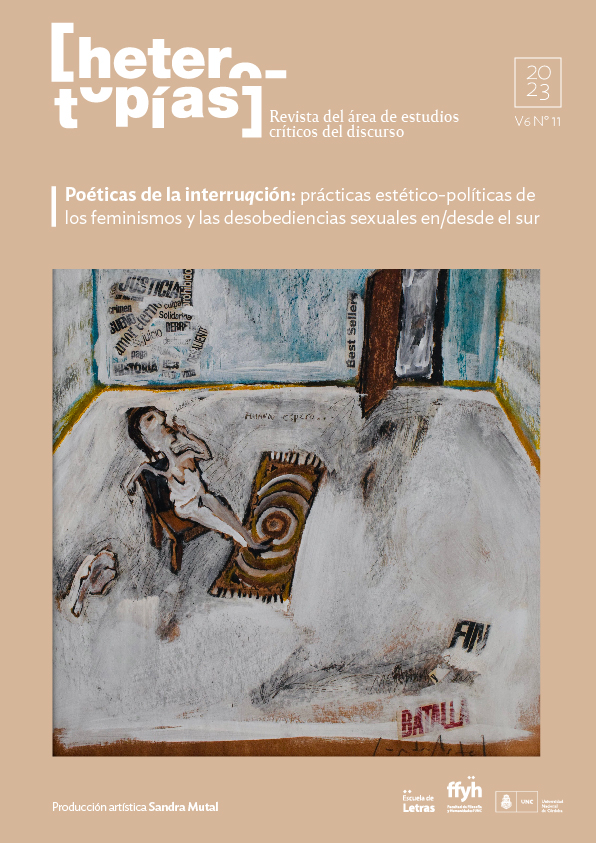Lesbian sensivities in Argentine Literature: political power in the delirious fiction of Dalia Rosetti and the words of love or Marie Gouiric
Main Article Content
Abstract
In this article I am interested in dwelling on the analysis of the representations of the lesbian in two current texts, the novel El fuego entre nosotras (2021) by Dalia Rosetti and the book of poems This love so great (2022) by Marie Gouiric. These books take on a political potential because Rosetti imagines a revolution that destroys everything in the midst of a critique of the art markets and a record of the different itineraries of love and desire.
And because in Marie Gouiric's poems there is a voice that recovers always marginalized women and celebrates them seeking to create an unsubmissive lineage. Both texts create spaces for invention where lesbian sexuality is presented as rebellious against the games of power, disobedient to the canons and hierarchies presented by the world of art, questioning impositions while presenting a moved and sensitive subjectivity, which establishes bonds and affiliations with her predecessors and overflows affections towards the world.
In this work, I am interested in addressing these locations from a reading that recovers the political sense of affects (Ahmed, 2016) and of stories to think about literary representations as worlds that bring into play dynamics of meanings that create sensitivities, affects, and perceptions that constitute the social and shape the political.
Rosetti's novel and Gouiric's poems invent a space from which sexual dissidence gains political power through its attack on the established orders but also through its display of lesbian affectivities sensitive to the other.
Downloads
Article Details

This work is licensed under a Creative Commons Attribution-NonCommercial-ShareAlike 4.0 International License.
Those authors who have publications with this journal, accept the following terms: Those authors who have publications with this journal, accept the following terms:
a. The authors will keep their copyright and guarantee to the journal the right of first publication of their work, which will be simultaneously subject to the Creative Commons Attribution - Non-Commercial - Share Alike (by-nc-sa) Attribution License; no commercial use of the original work or any derivative works is allowed, the distribution of which must be done with a license equal to the one that regulates the original work.
b. Authors may adopt other non-exclusive license agreements for the distribution of the published version of the work (e.g., deposit it in an institutional telematic archive or publish it in a monographic volume) provided that the initial publication in this journal is indicated.
c. Authors are allowed and recommended to disseminate their work through the Internet (e.g. in institutional telematic archives or on their website) before and during the submission process, which may lead to interesting exchanges and increase the number of citations of the published work. (See The effect of open access).
References
Ahmed, S. (2016). La política cultural de las emociones. México: Cialc.
Aira, C. (1992). La prueba. Buenos Aires: Grupo Editor latinoamericano.
Arnés, L. (diciembre de 2013). Zonas liberadas: la literatura argentina en clave lesbiana. En Boletin 17 del Centro de Estudios de Teoría y crítica literaria.
Arnés, L. (2016). Ficciones lesbianas, literatura y afectos en la cultura argentina. Buenos Aires: Madreselva.
Arnés, L. y Saxe, F. (comps.). (2019). Escenas lesbianas. Tiempo, voces y afectos disidentes. Buenos Aires: Ediciones La Cebra.
Cano, V. (2022). Po/éticas afectivas, apuntes para una reeducación sentimental. Buenos Aires: Galerna.
Cragnolini, M. (2016). Extraños animales. Filosofía y animalidad en el pensar contemporáneo. Buenos Aires: Prometeo.
Dufourmantelle, A. (2019). Elogio del riesgo, Bs. As.: Nocturna editora.
Gouiric, M. (2021). Este amor tan grande. Bs. As.: Mansalva.
Haraway, D. (2019). Seguir con el problema, Bs. As.: Consonni.
Kohan, A. (2020). Y sin embrago, el amor. Bs. As.: Paidós.
Ludmer, J. (1999). El cuerpo del delito, un manual. Buenos Aires: Perfil.
Macón, C. (2021). Desafiar el sentir. Feminismos, historia y rebelión. Buenos Aires: Omnívora.
Molloy, S. (2022). Animalia. Buenos Aires: Eterna Cadencia.
Moraña, M. (2012). Postscríptum. El afecto en la caja de herramientas. En Moraña, M. y Sánchez Prado, I. El lenguaje de las emociones, afecto y cultura en América Latina. Madrid: Iberoamericana Vervuert.
Moreno, María (2006) “La flor de mi secreto” Página 12, 16 de julio https://www.pagina12.com.ar/diario/suplementos/libros/10-2154-2006-07-16.html
Murillo, E. (14 de enero 2022). Este amor tan grande: poesía para volar por los aires. En Página 12. Recuperado de https://www.pagina12.com.ar/394661-este-amor-tan-grande-poesia-para-volar-por-los-aires
Preciado, B. (2008). Testo Yonqui. Madrid: Espasa Calpe.
Rosetti, D. (2021). El fuego entre nosotras. Buenos Aires: Random House.
Rotger, P. (2014). Representaciones de la lesbiana en la literatura argentina. En Delich, F. (Coord.) Muerte del sujeto y emergencias subjetivas. Córdoba: Comunicarte.
Rotger, P. (2019). Disidencia lesbiana y ficción política: habitar las resistencias. En Arnés, L. y Saxe, F. (comps.) Escenas lesbianas, tiempos, voces y afectos disidentes. Buenos Aires: Ediciones La Cebra.
Rotger, P. (2023). Cartografías lesbianas: lazos y afectividades en la literatura argentina. En AAVV Historia feminista de la literatura argentina, tomo lV. Villa María: Eduvim. (en prensa).
Trerotola, D. (30 de abril de 2021). El fuego entre nosotras, la nueva novela de Dalia Rosetti / Fernanda Laguna. En Página 12. Recuperado de https://www.pagina12.com.ar/338279-el-fuego-entre-nosotras-la-nueva-novela-de-dalia-rosetti-fer
Yelin, J. (2020). Biopoéticas para las biopolíticas. El pensamiento literario latinoamericano ante la cuestión animal. Pittsburgh: Latin America Research Commons.
